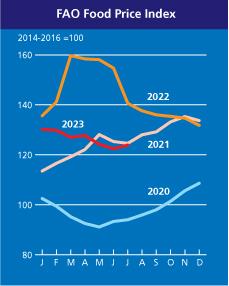 The United Nations Food and Agriculture Organization announced that the Food Price Index incorporating cereals, meat, vegetables, and dairy products increased by 1.3 percent in July from the previous month reversing the declining trend extending for over a year. U.K. food prices rose 17.4 percent over the year through June, prices in Japan were up 8.9 percent and in France by 14.3 percent. The U.S. is fortunate in enduring a 4.9 percent increase in July, down considerably from an August 2022 peak of 13.5 percent. Notwithstanding the relatively stubborn level of food inflation in the U.S., inflation is progressively declining, attaining 3.2 percent on an annual basis.
The United Nations Food and Agriculture Organization announced that the Food Price Index incorporating cereals, meat, vegetables, and dairy products increased by 1.3 percent in July from the previous month reversing the declining trend extending for over a year. U.K. food prices rose 17.4 percent over the year through June, prices in Japan were up 8.9 percent and in France by 14.3 percent. The U.S. is fortunate in enduring a 4.9 percent increase in July, down considerably from an August 2022 peak of 13.5 percent. Notwithstanding the relatively stubborn level of food inflation in the U.S., inflation is progressively declining, attaining 3.2 percent on an annual basis.
The factors contributing to food price inflation include climatic extremes affecting yields, the disruption of production and export from Ukraine together with the direct effects of inflation in fuel and fertilizer prices.
 Some nations are responding to food price inflation by imposing export bans on commodities. This may have a transitory beneficial effect domestically but places importing nations at a disadvantage as supply-demand equilibrium is distorted. Many governments are investigating whether price gouging is occurring along the chain of production and distribution. Although the U.K. Competition and Markets Authority failed to determine any deliberate inflationary action by retailers, supply chains in that nation are now under review. France has embarked on an extensive program of investigating food prices and for some time has been using informal and indirect persuasion on retailers to reduce margins.
Some nations are responding to food price inflation by imposing export bans on commodities. This may have a transitory beneficial effect domestically but places importing nations at a disadvantage as supply-demand equilibrium is distorted. Many governments are investigating whether price gouging is occurring along the chain of production and distribution. Although the U.K. Competition and Markets Authority failed to determine any deliberate inflationary action by retailers, supply chains in that nation are now under review. France has embarked on an extensive program of investigating food prices and for some time has been using informal and indirect persuasion on retailers to reduce margins.
Ultimately for political reasons, governments may impose price controls on essential food items. This invariably results in shortages, the emergence of black markets and is ultimately self-defeating. Classic economic theory maintains that high prices are usually the cure for high prices as domestic output or importation increase to satisfy demand.